Body Detoxification Definition
Body detoxification is a process where the body rids itself of waste materials that enter the body through food, liquid, the atmosphere, and skin. Under normal functioning, the body attempts to cleanse itself of toxins.
Body detoxification is the process of removing harmful toxins from the body. The body has its own natural detoxification system, but it can be overwhelmed by environmental pollutants, poor diet, and stress. There are many different ways to detoxify the body, including diet, exercise, and supplements.
This article provides a definition of body detoxification, discusses the benefits of detoxing, and reviews some of the most popular methods.
Reasons for the Presence of Toxins in the Body
Toxins are poisons of chemical or natural origin, which are constantly present in our body and are a product of its life activities or come from the environment.
The main reasons for the appearance of toxins in the human body are:
- Consumption of specially treated and preserved foods.
- Fruits and vegetables containing pesticides.
- Living in environmentally unfavorable areas.
- Unhealthy working conditions.
- Polluted indoor air (building materials, household items).
- Use of poor-quality cleaning and cosmetic products.
- Excessive alcohol consumption, smoking.
- Food poisoning or exposure to chemical substances.
- Prolonged contact with heavy metal salts.
- Uncontrolled use of medications.
 According to doctors, an excess of toxins leads to constant headaches, a decrease in immunity, joint and soft tissue pain, decreased productivity, and increased irritability. The scientific community leans towards the theory that toxins in the body, or rather their excess, are a direct cause of premature aging.
According to doctors, an excess of toxins leads to constant headaches, a decrease in immunity, joint and soft tissue pain, decreased productivity, and increased irritability. The scientific community leans towards the theory that toxins in the body, or rather their excess, are a direct cause of premature aging.
Toxins We Encounter Every Day
Each person is exposed to toxins daily, which are an unavoidable part of life. We already know how dangerous household items can be and what happens to the body under the daily impact of toxic substances.
Cleaning agents, specially treated food products, medicines – all of these contain more or less toxins, heavy metals, microbes, and chemical substances that accumulate in the body and cause slow, irreversible processes, deteriorating human health.
 Symptoms of High Toxin Levels
Symptoms of High Toxin Levels
First and foremost, toxins in the body disrupt its coordinated work, which immediately leads to intoxication. If the hair loses its shine, falls out or breaks, the skin begins to flake, puffiness and dark circles appear under the eyes – these are clear signs of the presence of toxins in the body.
Body detoxification (cleansing) should be done when the following symptoms appear:
- Decreased immunity. Constant colds during seasonal transitions, when the body needs additional help.
General malaise and chronic fatigue. Feeling of depression, fatigue, prolonged rest does not restore strength. - Hormonal imbalance. Changes in the perception of smells and taste qualities, increased sweating and weight fluctuations.
- Digestive disorders. A feeling of heaviness in the stomach, pain, nausea, excessive body weight.
This is also a sign of toxin accumulation in the body. - Nasal congestion. Toxins and microbes often lead to sinus infection, which can be accompanied by pus discharge from the nasal cavity.
- Coating on the tongue. If there is a yellow or white coating with an unpleasant smell from the mouth, this indicates a large accumulation of toxins in the body.
- Skin problems. The formation of acne, dry skin indicates the accumulation of toxic deposits in the body.
The presence of toxins leads to a decrease in the production of the sleep hormone (melatonin), as a result, sleep worsens.
The need for detoxification arises when problems appear from the body’s metabolic processes. At the same time, there is a constant feeling of heaviness in the abdomen, and extra pounds appear.
How to Remove Toxins from the Body
 Proper detoxification implies a complex of measures, which includes control over diet, daily routine, metabolic processes, and measures taken to remove poisonous substances from the body (mandatory!). The choice of a detoxification program may be influenced by certain factors: pregnancy, working conditions, individual intolerance, and severity of the disease. A clear distinction should be made between weight loss diets and detoxification diets.
Proper detoxification implies a complex of measures, which includes control over diet, daily routine, metabolic processes, and measures taken to remove poisonous substances from the body (mandatory!). The choice of a detoxification program may be influenced by certain factors: pregnancy, working conditions, individual intolerance, and severity of the disease. A clear distinction should be made between weight loss diets and detoxification diets.
To remove toxins, the following measures are sufficient:
- Drink more than 2 liters of fluid per day ;
- Consume foods rich in fiber (fresh fruits, vegetables, legumes);
- Reduce the consumption of salt, which absorbs fluids and hinders metabolism;
- Pay attention to smoothies (cocktails of vitamins and fiber);
- Enrich the diet with white meat and cereals, it’s better to exclude pasta;
- Emphasize physical activity that increases the process of sweating (shaping, Pilates, yoga, exercise complexes, walking) and physiotherapy (bath procedures, cryosauna).
- Use similar products like detox foot pads
Existing risks should also be minimized by reducing the impact of negative environmental factors on the body. For drinking and cooking, purified water should be used with the help of special water filters. The diet should include products grown in ecologically favorable conditions.
It is impossible to cleanse the body of toxins once and for all. The only correct solution is prevention. It is recommended to take vitamins and dietary supplements that stimulate metabolic processes.
 Symptoms of High Toxin Levels
Symptoms of High Toxin Levels